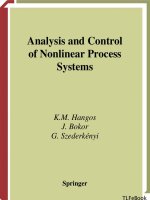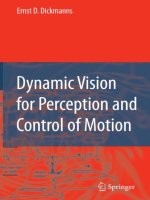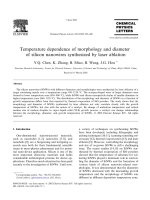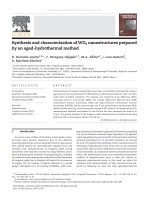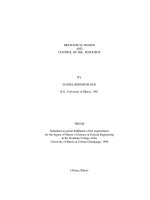- Trang chủ >>
- Khoa Học Tự Nhiên >>
- Vật lý
ROTARY INVERTED PENDULUM AND CONTROL OF ROTARY INVERTED PENDULUM BY ARTIFICIAL NEURAL NETWORK
Bạn đang xem bản rút gọn của tài liệu. Xem và tải ngay bản đầy đủ của tài liệu tại đây (665.91 KB, 7 trang )
Proc. Natl. Conf. Theor. Phys. 37 (2012), pp. 243-249
ROTARY INVERTED PENDULUM AND CONTROL OF ROTARY
INVERTED PENDULUM BY ARTIFICIAL NEURAL NETWORK
NGUYEN DUC QUYEN(1) , NGO VAN THUYEN(1)
(1) University of Technical Education, 1 Vo Van Ngan Street,
Thu Duc District, Ho Chi Minh City
NGUYEN QUANG HOC(2)
(2) Hanoi National University of Education, 136 Xuan Thuy Street,
Cau Giay District, Hanoi
and NGUYEN DUC HIEN(3)
(3) Tay Nguyen University, 456 Le Duan Street, Buon Me Thuot City
Abstract. Inverted pendulum is an unstable and highly nonlinear system. It is used as a common
model for engineering applications in linear and nonlinear control. This paper presents the physical
structure, the dynamic model of rotary inverted pendulum system and the method of identifying,
controlling this system by an artificial neural network (ANN). This network is a mathematical
model based on the structure and the function of a biological neural network. This is a state-ofthe-art method of controlling which has many advantages such as the control of nonlinear object,
the ability of learning and accumulating experiences and the ability of adjusting to any change of
parameters in the system.
I. INTRODUCTION
The inverted pendulum is a pendulum with its centre of gravity over its axis of
rotation. The normal pendulum has its centre of gravity under its axis of rotation and
therefore, it is in stable state when it directs downwards. The inverted pendulum is in
unstable state because its centre of gravity is over its axis of rotation. A raised problem
is how it is necessary to control the inverted pendulum so that it can keep its equilibrium
state when it directs upwards.
The study of mathematical model, dynamic model and algorithms in controlling
the inverted pendulum plays very important role in controlling rockets and spacecrafts
and in maintaining the equilibrium state for two legs robots, skyscraping buildings, etc.
At present, there are many algorithms in controlling systems of pendulum such as: PID
control, slide control, fuzzy logic control and artificial neural network (ANN) control. Controllers based on their actions around a point will be unsuccessful if any change happens.
An advantage of the ANN controller is that there is any change in action process of system, the ANN can adjust itself to this change and maintain its control. Other controllers
cannot do that.
This paper studies the mathematical model and the dynamic model of rotary inverted pendulum and applies the algorithm of ANN control in the form of feed-forward in
order to identify the system and then carry out the control of a rotary inverted pendulum
by the ANN on the Matlab and the DSP TMS320 F2812.
244
II. MATHEMATICAL MODEL FOR SYSTEM OF ROTARY INVERTED
PENDULUM
Figure 1. Calculation model for system of a rotary inverted pendulum
The system of a rotary inverted pendulum shown in Figure 1 consists of a pendulum
attached to a horizontal bar. The pendulum has the mass m and the length 2L and can
rotate freely. It sets up the angle α for vertical direction. The horizontal bar has the
length r and is used to move in inverse and forward directions with the angle θ.
Supposing that the gravity of pendulum is at point B. Point B carries out a rotational motion compared with point A and the rotational velocity of point B has the
following components
x˙ AB = −Lα˙ cos α,
y˙ AB = −Lα˙ sin α.
(1)
˙ Therefore,
Besides, the pendulum still rotates around point O with the velocity rθ.
the velocity of point B compared with fixed point O can be described by the equation as
follows
x˙ B = rθ˙ − Lα˙ cos α,
y˙ B = −Lα˙ sin α.
Differentiate two sides of (2), we obtain
(2)
x
¨B = rθ¨ + Lα˙ 2 sin α − L¨
α cos α,
(3)
y¨B = −Lα˙ 2 cos α − L¨
α sin α.
This is the result of applying the Newton’s Second Law in direction x and in direction
y. Figure 2 describes forces acting on the arm and the pendulum. From that,
m¨
xB =
Fx ⇒ mrθ¨ + mLα˙ 2 sin α − mL¨
α cos α = Ax ,
(4)
m¨
yB =
Fy ⇒ −mLα˙ 2 cos α − mL¨
α sin α + mg = Ay .
(5)
Applying the Euler equation to the rotational motion of pendulum around point B,
we obtain
245
1
1
m (2L)2 α
¨ = Ax L cos α+Ay L sin α ⇒ mL2 α
¨ = Ax L cos α+Ay L sin α.
12
3
(6)
The equation for the rotational motion of arm around point O has the form
JB α
¨=
MB ⇒ −
JO θ¨ =
MO ⇒ Jeq θ¨ = TL − Beq θ˙ − Ax r.
(7)
Figure 2. Forces acting on arm and pendulum
Substituting (4) and (5) into (6), we have
1
mL2 α
¨ = mrθ¨ + mLα˙ sin α − mL¨
α cos α L cos α+(mg − mLα˙ cos α − mL¨
α sin α) L sin α
3
4
⇒ −mLrθ¨ cos α + mL2 α
¨ − mgL sin α = 0.
3
Substituting (4) into (7), we obtain
(8)
Jeq θ¨ = TL − Beq θ˙ − mrθ¨ + mLα˙ 2 sin α − mL¨
α cos α r
˙
⇒ Jeq + mr2 θ¨ − mLrα
¨ cos α + mLrα˙ 2 sin α = TL − Beq θ,
(9)
where
Vm − KE θ˙
¨
− Jm θ.
TL = Tm − Jm θ¨ = µm KM Im − Jm θ¨ = µm KM
Rm
Substituting (9) into (10), we have
(10)
KE
Jeq + mr2 + Jm θ¨ − mLrα
¨ cos α + mLrα˙ 2 sin α + Beq + µm KM
Rm
Vm
θ˙ = µm KM
.
Rm
(11)
The system of equations describing the nonlinear kinetic characteristics of system has the
form
1
1
θ¨ =
b¨
α cos α − bα˙ 2 sin α − eθ˙ + f Vm , α
¨=
d sin α + bθ¨ cos α ,
(12)
a
c
where the parameters a, b, c, d, e and f have the form
a = Jeq + mr2 + Jm , b = mLr, c = 4mL2 /3, d = mdl,
e = Beq + µm KM KE /Rm , f = µm KM /Rm
(13)
246
For small α, sin α ≈ α, cos α ≈ 1, the linearization of (12) leads to the system of equations
as follows
1
1
b¨
α − eθ˙ + f Vm , α
¨=
dα + bθ¨ .
θ¨ =
a
c
(14)
The mathematical model obtained in the system of equations (12) is used to build the
model of inverted pendulum on the Simulink of Matlab in next sections.
III. IDENTIFYING AND CONTROLLING ROTARY INVERTED
PENDULUM SYSTEM BY ARTIFICIAL NEURAL NETWORK
The artificial neural network (ANN) is trained to identify the system of pendulum
of 1 input and 2 outputs. Supervised learning uses the input and output data to train the
network and the training data is derived from the model of pendulum system with the
PID controller of two variables. The input is the signal of voltage and the output is the
deflection angles α and θ of the pendulum. The trained ANN model is tested qualitatively
by calculating the MSE (mean square error). The MSE is a good measure in order to
determine the accuracy of model. The smaller the MSE between the identifying ANN and
the model of pendulum is, the better the accuracy is.
The ANN has the ability to model the pendulum. The MSE is small and the ANN
model can foresee the deflection angle of pendulum. The results in Table 1 show that the
more increases the number of neurons in hidden layer, the smaller the MSE between the
identifying ANN and the model of pendulum is.
The quality of the model of network identifying is tested more by putting a source
of random perturbation in the system with the amplitude 0.01. The result of response
shows that the ANN adjusts itself to this change and identifies well with rather small error
as described in Figure 4.
Figure 3. Identifying model of pendulum system by ANN
247
Figure 4. Result of identifying angle α by ANN and model of system with noise
Table 1. Result of identifying
Form of neural Number of neunetwork
rons in hidden
layer
FF
4
FF
10
FF
20
FF
40
when number of neurons changes
Number of train- Speed
of Error (MSE)
ing time
learning
500
500
500
500
0.0001
0.0001
0.0001
0.0001
2.5509.10−12
1.0448.10−12
9.325.10−13
6.7929.10−13
When the mass of pendulum is changed from 0.125 to 1 kg, the ANN controller adjusts
itself to these changes so that the pendulum is in stable state as shown in Figure 5.
Figure 5. Dependence of angle α on m
IV. RESULTS OF EXPERIMENT
The system of inverted pendulum is controlled by the ANN on the DSP TMS320F2812
with the sketch of control in Figure 6 and the system of experiment in Figure 7. The programme of control is written in the Matlab. The trained ANN controller keeps stable
pendulum in vertical position and in upward direction. Figure 8 describes the response of
pendulum angle in applying the ANN controller.
When the pendulum moves to the position corresponding to L = 32 cm, the ANN
controller adjusts well itself to this change and the result is shown in Figure 9. Results
248
Figure 6. System of controlling rotary inverted pendulum by ANN
Figure 7. System of experiment
of simulation show that the identification of system the multilayer ANN gives good result
of identifying with small error as presented in Table 1. The ANN controller controls
successfully the pendulum system. When the parameters of system change, the ANN
controller adjusts well itself to these changes and that is described in Figure 5. The ANN
controller controls stably the system of inverted pendulum with small deflection angle and
that is shown in Figure 8. When changes the arm (L) of pendulum, the ANN controller
gives good response and that is illuminated in Figure 8 and in Figure 9.
V. CONCLUSION
This paper presented the physical structure and the dynamic model of rotary inverted pendulum and the method of identifying the system of rotary inverted pendulum
by the multilayer ANN. The ANN controller is used to control stably this system.
Obtained results of control algorithm can be applied to real physical systems with
high nonlinearity and especially physical systems having the centre of gravity on the axis
of rotation such as rockets, the spacecrafts, skyscraping buildings, etc.
Obtained results of identifying nonlinear system can be applied to complex physical systems and objects mathematical model of that cannot be built exactly. Then, the
application of identifying method by ANN is a very good method.
249
Figure 8. Angle α with neural network when m = 0.25 kg (L = 16 cm)
Figure 9. Angle α with neural network when m = 0.25 kg (L = 32 cm)
REFERENCES
[1] T.Callinan, Master Thesis, Dublin City University (2003)
[2] M.A. Khanesar, Sliding Mode Control of Rotary Inverted Pendulum, Iran (2007)
[3] A.Guez and J.Selinsky, Journal of robotic systems 5, 4(1988) 363
[4] K.J.Hunt, D. Sbarbaro, R. Zbikowski and P.J. Gawthrop, Automatica 28(1992) 1083
[5] Neural Network Toolbox Users Guide, The Mathworks Inc (1998)
[6] D.T.Pham and X. Liu, Neural Networks for Identification, Prediction and Control,
Springer (1999)
.
